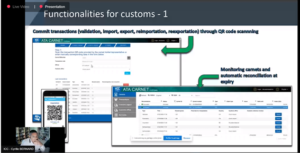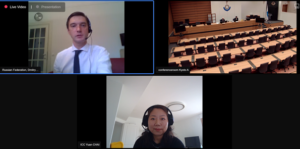
ATA Carnet
ICC presents electronic ATA Carnet at annual World Customs Organization meeting
The International Chamber of Commerce (ICC) provided an update on the electronic ATA Carnet (eATA) pilot project as part of the World Customs Organization’s annual ATA/Istanbul Administrative council meeting.
The virtual meeting – which gathered customs experts from around the world – discussed ICC’s eATA Carnet pilot project, the impact of COVID-19 on ATA Carnet operations, as well as interpretation issues related to ATA Carnet claims.
The ATA Carnet is an international customs document that permits duty-free and tax-free temporary import of goods for up to one year. ICC is the international organisation administering the global guarantee chain that all national guaranteeing associations are affiliated with.

Cyrille Bernard, ICC Information System Architect, presented an overview of the technical aspects associated with the ICC eATA Carnet, including the project’s underlying architecture and security measures. Mr Bernard also updated delegates on the timeline regarding the project’s deployment and adoption by customs agencies worldwide.
Customs representatives from China andSwitzerland, shared their experiences with the eATA Carnet pilot and offered their support for the project moving forward. The Directorate-General for Taxation and Customs Union of the European Commission (TAXUD) reiterated its support for the eATA project pilot. Last year, ICC Secretary General John W.H. Denton AO and the former Director General of TAXUD released a video in support of the eATA Carnet pilot project.

Yuan Chai, ICC ATA Carnet Manager, discussed ICC’s support to eATA pilot participants, including the availability of training and support materials. Ms Chai also illustrated the challenges faced by national customs authorities and the support that they require to accelerate the adoption of eATA Carnets. To pave the way for national customs agencies to adopt eATA Carnets, a standardised notification template was discussed and endorsed by the Committee. The template will set clear guidelines for governments and national customs agencies as they implement eATA Carnets as part of their national customs policies.
Ms Chai also reported on the difficulties faced by ATA Carnet holders and guaranteeing associations during the COVID -19 crisis, such as forced delays of re-exportation and issues with replacement ATA Carnets. Policies aimed at limiting the spread of the pandemic, like necessary public lockdown measures, disrupted international travel and logistics, including the processing of ATA Carnets.
In this context, Ms Chai called upon national customs agencies to demonstrate greater tolerance and understanding when processing ATA Carnets. As the global economy builds back better from COVID-19, Ms Chai stressed that cooperation between customs authorities and the private sector will be critical to help small- and medium- sized enterprises fully overcome the crisis.
Henk Wit, Deputy Chair of the ICC World Chambers Federation World ATA Carnet Council, and Christophe Coulie, member of the ICC World Chambers Federation World ATA Carnet Council and Legal Affairs Manager at Belgian Chambers, also participated in the meeting. Mr Coulie raised issues related to the interpretation of the Istanbul Convention with committee members to gain better insight into the matter.
The eATA Carnet pilot project is aligned with ICC’s commitment to digitalise trade for the 21st century by reducing the private and public sector’s dependency on paper-based processes.
Learn more about the eATA Carnet pilot project.
